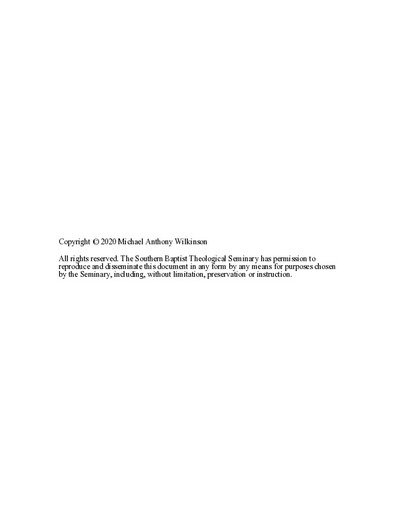| dc.contributor.advisor | Wellum, Stephen J. | |
| dc.contributor.author | Wilkinson, Michael A. | |
| dc.date.accessioned | 2020-12-03T14:50:25Z | |
| dc.date.available | 2020-12-03T14:50:25Z | |
| dc.date.issued | 2020-12-01 | |
| dc.identifier.uri | https://hdl.handle.net/10392/6403 | |
| dc.description.abstract | This dissertation argues for the extension of Christ’s ontological constitution as the man to define the constitution of all mankind. In contrast to the predominant body-soul/mind models, this dissertation presents a person-nature model of humanity.
Chapter 1 introduces and analyzes the current debate in anthropology between models grounded in a dualist versus a physicalist understanding of the human soul and body. The debate, and its identification of person with the soul or human being, provide a point of departure for a new model of humanity grounded in the human ontology of Christ.
Chapter 2 provides biblical warrant for the new model by demonstrating that the presentation of Christ as the image and redeemer of God points to an ontological correspondence with all humanity. The chapter also provides epistemological warrant by framing a basic methodology and historical pattern for a metaphysical move from Christology to anthropology.
Chapter 3 provides historical warrant by tracing the early church’s formation of an orthodox ontology grounded in a distinction between the ontological categories of person and nature. The Chalcedonian Definition extended the person-nature being of God to the divine-human being of God the Son incarnate, confessing that the Christ is one person in two natures.
Chapter 4 adds historical warrant by tracing the clarifications made in the pro-Chalcedonian tradition to demonstrate the coherence of Christ’s person-nature constitution as a man. The divine person of the Son is and acts as a human being by subsisting in and acting through his human nature, which is composed of a body and complete soul.
Chapter 5 presents a Chalcedonian model of humanity as a warranted theological conclusion by analyzing Christ’s orthodox ontology and extending it into anthropology via discrete ontological propositions, which define a human being as a human person subsisting in a body-soul nature. Drawing inferences and making adjustments as required demonstrates that man par ordinaire is a person-nature analogue of the man par excellence.
Chapter 6 provides an initial defense of a person-nature anthropology by addressing two objections. The dissertation concludes by discussing the promise of a Chalcedonian anthropology and the work needed to realize it. | en_US |
| dc.subject.lcsh | Jesus Christ--Person and offices | en-us |
| dc.subject.lcsh | Theological anthropology--Christianity | en-us |
| dc.subject.lcsh | Image of God | en-us |
| dc.title | Chalcedonian Anthropology: A Proposal for the Extension of Christ’s Person-Nature Constitution | en_US |
| dc.type | Electronic dissertation | en_US |
| dc.type | Text | |
| dc.contributor.committee | Allison, Gregg R. | |
| dc.contributor.committee | Haykin, Michael A. G. | |
| dc.type.qualificationname | Ph.D. | en_US |
| dc.publisher.institution | Southern Baptist Theological Seminary | en_US |
| dc.publisher.department | School of Theology | |

